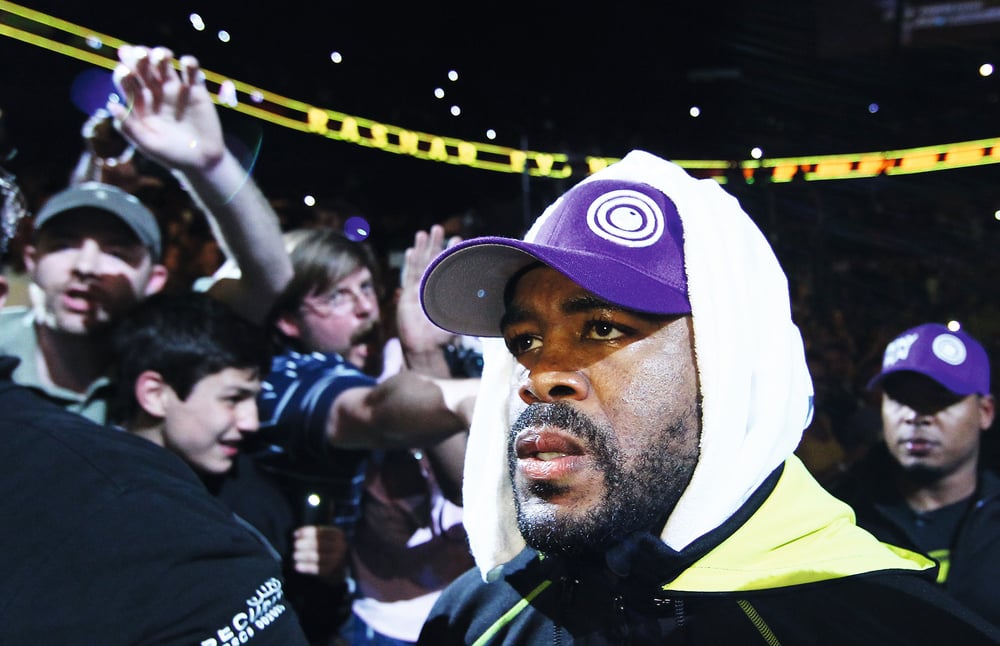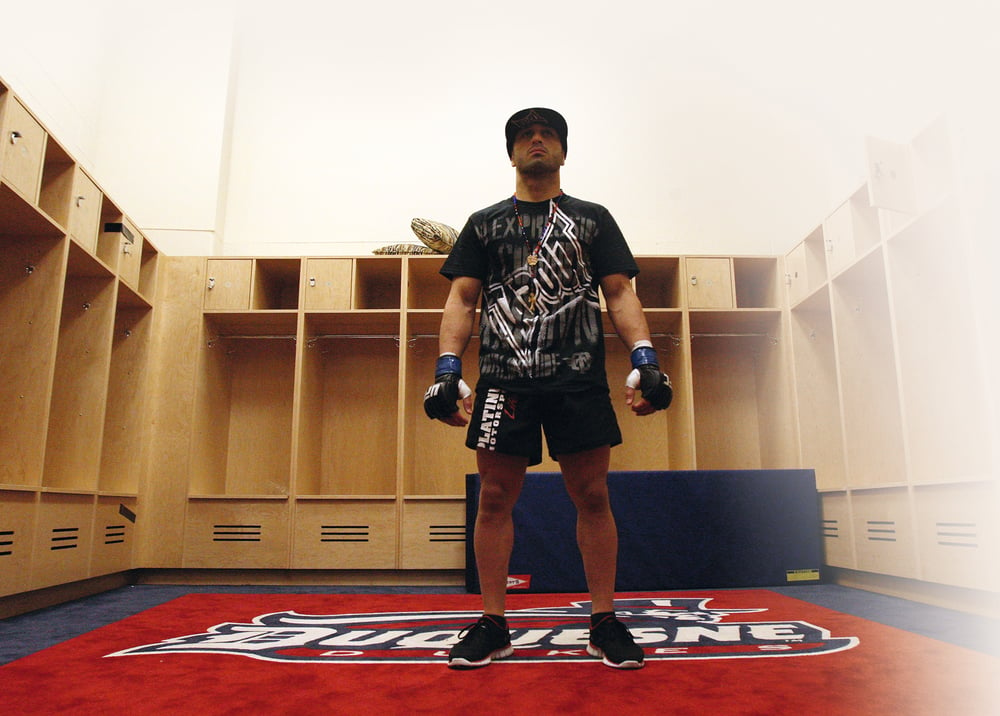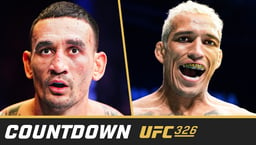
Issue 106
October 2016
Keeping a fighter’s mind active in the final few hours before a fight can make or break a performance, reveals Grudge Training Center head coach Trevor Wittman
Only fighters possess the ability to relate to fighters on the day of a fight. For the rest of us the very notion of training, cutting weight and trading debilitating blows with a shirtless human being in front of a crowd of thousands is the stuff of nightmares. It’s not something we were born to do. No, it unquestionably takes a special kind of person to hold it together in such a situation; a unique breed known as fighters.
Leading mixed martial arts trainer Trevor Wittman was once a fighter, an amateur boxer, no less, but saw his own athletic career grind to a halt following an injury. He now spends most of his days watching others at his Grudge Training Center in Denver, Colorado, where he mentors some of the very best mixed martial artists in the world.
“The physical training part is the easy part. I feel our success comes from working on the mental side of things and ensuring our fighters are better equipped, mentally, to deal with a fight than their opponent. It’s very in-depth, and you’ve really got to know your fighter, but it’s so rewarding,” Wittman explains to FO.
“I almost feel like a dad to all my fighters. I have to know when to pat them on the back and give them a hug, and I’ve also got to know when to punish them and not let them out the house for a weekend. If you know your fighter like he’s your son, you know how to push his buttons and get the desired results.”
Coach, mentor and father figure, Wittman wears a number of hats throughout fight week, and embraces the responsibility attached to each of them. For him, the job never stops. Even when training camp wraps up and the fight draws close, there is still work to be done. Indeed, many believe training is only half the battle, and that the other half takes place in the fighter’s mind days and hours before the first bell. Thankfully, this is where Wittman is in his element.
“I’m always entertaining on the day of the fight,” he admits. “My focus is to get my fighter’s focus away from the fight. I want them to think of everything but the fight. I’ll either make them laugh or talk about any old nonsense, or I’ll get them to remember their greatest moments in MMA to date and have them in a positive mind-set for the rest of the day. I believe if you feel good, you’ll perform good.
“Before we get on the bus or the shuttle to go to the venue, I’ll normally go back to my room and visualize. I step into the shower, switch the lights out and then lie down on the floor with my eyes closed. It’s a calming atmosphere for me and I know every hotel has a shower, too, so it has become something of a routine over the years. I visualize best and worst case scenarios for my fighter and think about how I might deal with certain situations. I focus the same way a fighter would.”

SWITCHED ON
On the day of a fight, it’s all mental. Any collapse at this stage owes everything to nerves, anxiety or the sudden negativity that ransacks the thoughts of even the finest competitors. Wittman describes fight day as “the coolest process anyone can witness,” and believes what separates the great from the good is an ability to cope with everything their own mind throws at them in those precious final hours. To this coach, process makes perfect.
“For starters,” he begins, “we normally do a little 15-minute shake-out in the hotel, just to get a sweat going before we head to the arena. You see the fighter get very serious during those workouts, as their mind is clearly on the fight. Once that’s done, we do a short visualization session.
“While waiting to get on the van, a fighter won’t speak much at all. They sense their opponent nearby, perhaps waiting to get on another bus, and it puts them on edge. I’ll try and joke with them and make them laugh, but there’s really not much humor at that stage.
“When we’re driving through a city, you’ll see fighters staring out the window and looking at various things. But you know they’re not looking at anything in particular. They can’t shake the fight from their mind. Even when they’re looking at other stuff, they’re thinking about the fight.
“As we arrive at the venue and the fighter eyes up the enormity of it all, the motor really starts to rev up. Locker rooms are a pretty calming environment, simply because there is typically quite a few people around. There will be a lot of commotion, and you’ll have guys fighting before you. This helps put a fighter’s mind at ease. They start to cheer up a bit, maybe even laugh and joke with the people around them.
“But once you start wrapping a fighter’s hands, they become the Terminator, a different person altogether. You barely recognize them. Their eyebrows curl in and the wrinkles on their face become more pronounced. They’re getting angry and aggressive. After that, there’s no more joking around or having fun; barely even any talking.
“When we finally reach the hallway and wait to go out, you’ll see a look on the fighter’s face that says, ‘Damn, why did I sign up for this s**t?’ The reality of the situation hits home. Yet, as they walk through the tunnel and see the crowd they become the ultimate showman, an entertaining machine. They find a smile, a bounce in their step, and they enjoy every moment. The strong and dominant part of their character has overcome the weak and anxious part and they can now see only victory ahead. Man, it’s such a transformation.”
Whether champions, contenders or young prospects just starting out, they all transform at that moment. And it’s the culmination of a long process, one that began the day they first decided to enroll in the pain game. Same journey, many different ways of getting there.
“Rashad Evans won’t eat the day of a fight,” reveals Wittman. “He can’t eat and he won’t eat. We try to force-feed him, but it never works. He simply refuses to do it. He’s never nervous about fighting, but he’s anxious about not performing to the best of his ability. He’s anxious that something might go wrong.
“Shane Carwin, meanwhile, was one of the calmest athletes I’ve ever had. The first time I wrapped his hands he sat in front of me and had a full-blown conversation about being an engineer. I couldn’t believe it. There he was having this routine conversation about a routine job, moments before getting punched in the face.
“Then you get kids like Justin Gaethje, who is simply born to fight and jokes around for every minute of the process. He loves fighting so much. He doesn’t care about winning or losing, he just wants to get in there and fight.”
Once the fight is finished, fighters again share headspace. They find common ground. Wittman explains: “Every time a fight is done – win, lose or draw – these guys will look back at me in the hallway and say, ‘I need to fight again soon, coach.’ Despite everything that comes before it – the training, the weight cut, the nerves, the apprehension – you can’t get that rush anywhere else. They miss it the second after it’s all over.”

TREVOR WITTMAN’S TOP 5 TIPS FOR PRE-FIGHT
1 SHAKE IT OFF
Before leaving for the venue Wittman will take his fighters through a quick workout, just to break a sweat and relieve any tension.
2 VISUALIZATION
Next, get your fighter to sit in a quiet, dark space and visualize the fight, and alternate scenarios that may come up once the bell goes. This should already be a staple session from the latter stages of fight camp.
3 COMEDY
In the final few hours, keeping a fighter’s mind off the fight with light-hearted conversation and jokes will help them stay relaxed, says Wittman.
4 RELAXATION
Once at the venue its imperative to keep a fighter talking either by mixing with teammates or fellow fighters. This will keep them from overthinking their own contest.
5 FOCUS
Finally, when the time comes, switching a fighter on to the fight ahead is all about triggers. Every good coach should master each individual fighters triggers to ensure maximum performance inside the ring.











